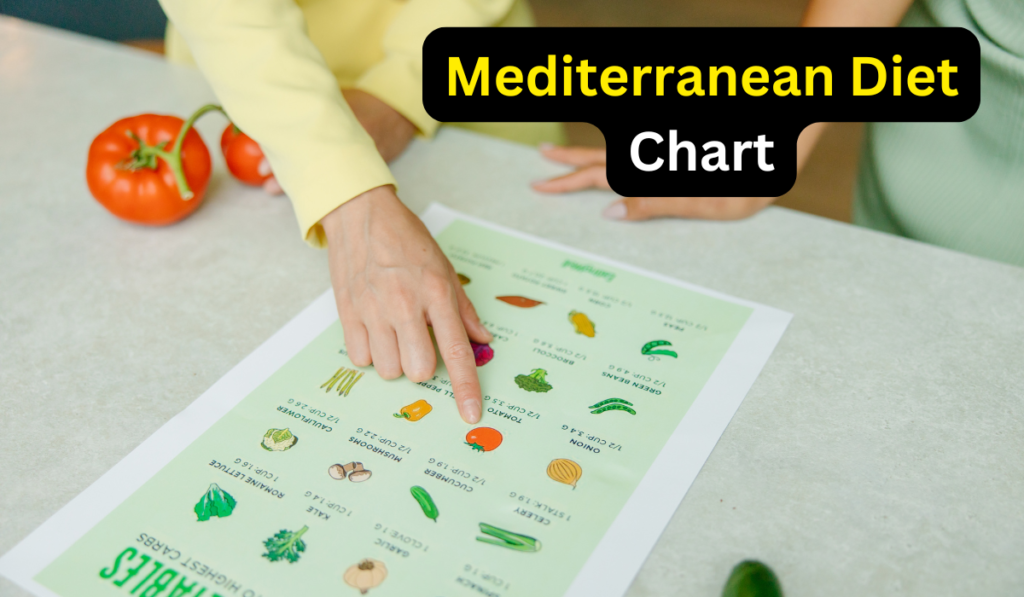The Mediterranean diet is more than just a way of eating—it’s a lifestyle. With its roots in the traditional eating habits of people in the Mediterranean region, this diet has gained worldwide popularity thanks to its delicious meals and health benefits. In this article, we’ll dive into everything you need to know about the Mediterranean diet, including recipes, meal plans, and a shopping list to help you get started!
What is the Mediterranean Diet?
The Mediterranean diet is inspired by the culinary traditions of countries bordering the Mediterranean Sea, such as Greece, Italy, and Spain. It focuses on whole, nutrient-rich foods, including plenty of fruits and vegetables, whole grains, lean proteins, and healthy fats. Unlike many restrictive diets, it emphasizes balance and moderation, making it easy to adopt as a long-term way of living.
Key Components of the Mediterranean Diet
- Healthy fats: Olive oil is a staple in the Mediterranean diet, providing heart-healthy monounsaturated fats.
- Fruits and vegetables: These form the foundation of the diet, offering vitamins, minerals, and fiber.
- Whole grains: Brown rice, quinoa, and whole wheat bread are preferred over refined grains.
- Lean proteins: Fish, particularly fatty fish like salmon, is the main protein source, with poultry and legumes also included.
- Nuts and seeds: These provide healthy fats and protein.
- Herbs and spices: Fresh herbs like basil, oregano, and rosemary replace salt in cooking.
Health Benefits of the Mediterranean Diet
The Mediterranean diet is widely regarded as one of the healthiest diets in the world. Here’s why:
1. Weight Loss Benefits
Studies show that people who follow the Mediterranean diet tend to lose weight and maintain a healthy weight. This is because the diet emphasizes whole foods that are naturally low in calories and high in fiber, keeping you full for longer and preventing overeating.
2. Heart Health
The Mediterranean diet is known for promoting heart health. The high intake of healthy fats from olive oil, nuts, and fatty fish helps reduce cholesterol levels, lower blood pressure, and reduce the risk of heart disease.
3. Improved Brain Function
The Mediterranean diet has been linked to improved cognitive function and a reduced risk of neurodegenerative diseases like Alzheimer’s. The abundance of antioxidants in fruits and vegetables, along with omega-3 fatty acids from fish, supports brain health.
Mediterranean Diet Food List
To help you get started with the Mediterranean diet, here’s a list of foods to focus on:
- Fruits and Vegetables: Tomatoes, leafy greens, berries, citrus fruits, bell peppers, cucumbers, and eggplant.
- Whole Grains: Brown rice, oats, quinoa, farro, whole wheat bread, and pasta.
- Healthy Fats: Olive oil, avocado, nuts (almonds, walnuts), and seeds (chia, flax).
- Lean Proteins: Fish (salmon, tuna, sardines), chicken, turkey, legumes (lentils, beans), and eggs.
- Dairy: Greek yogurt, cheese (in moderation), and milk.
- Herbs and Spices: Garlic, basil, oregano, thyme, rosemary, and cinnamon.
Foods to Avoid
- Processed meats
- Refined grains (white bread, pasta)
- Sugary snacks and desserts
- Fried foods
Mediterranean Diet Meal Plan
A typical Mediterranean diet meal plan focuses on variety and balance. Here’s an example of what a day might look like:
- Breakfast: Greek yogurt with fresh berries, a drizzle of honey, and a sprinkle of nuts.
- Lunch: A salad with mixed greens, tomatoes, cucumbers, olives, feta cheese, and olive oil dressing.
- Dinner: Grilled salmon with quinoa and steamed vegetables.
- Snack: A handful of almonds or a piece of fruit.

Mediterranean Diet Breakfast Recipes
Breakfast is an important part of the Mediterranean diet. Here are some easy recipes to get you started:
- Greek Yogurt with Honey and Almonds: Top a bowl of Greek yogurt with honey, sliced almonds, and fresh fruit for a nutritious and filling start to your day.
- Mediterranean Avocado Toast: Spread mashed avocado on whole grain toast, sprinkle with sea salt, and drizzle with olive oil for a simple yet satisfying breakfast.
- Oatmeal with Berries: Cook oatmeal with almond milk, then top with fresh berries, nuts, and a dash of cinnamon.
Easy Mediterranean Diet Recipes
If you’re short on time, don’t worry! Here are a few quick and easy Mediterranean diet recipes:
- Chickpea Salad: Combine canned chickpeas, cucumber, tomatoes, red onion, olives, and feta cheese. Toss with olive oil and lemon juice.
- Grilled Chicken with Veggies: Season chicken breasts with oregano and garlic, then grill and serve with roasted vegetables like zucchini, bell peppers, and onions.
- Mediterranean Hummus Wrap: Spread hummus on a whole grain wrap, add cucumber, tomatoes, lettuce, and feta cheese, and roll it up.
Mediterranean Diet Dinner Recipes
Dinner is where you can get creative with Mediterranean flavors. Here are some ideas:
- Baked Salmon with Asparagus: Season salmon fillets with olive oil, garlic, lemon, and herbs, then bake until flaky and tender. Serve with roasted asparagus on the side.
- Lentil Soup: Simmer lentils with tomatoes, onions, garlic, and spinach for a comforting and filling meal.
- Chicken Souvlaki: Marinate chicken in olive oil, lemon juice, garlic, and oregano, then grill and serve with a side of tzatziki sauce.
Mediterranean Diet Desserts
Yes, you can enjoy dessert on the Mediterranean diet! Here are a few healthier options:
- Greek Yogurt with Fresh Berries: Top Greek yogurt with a handful of mixed berries and a drizzle of honey.
- Baked Apples with Cinnamon: Core an apple, stuff it with nuts and raisins, and bake with a sprinkle of cinnamon.
- Dark Chocolate with Almonds: Enjoy a small piece of dark chocolate paired with a handful of almonds for a satisfying treat.
Mediterranean Diet for Weight Loss
1. Overview of the Mediterranean Diet
The Mediterranean diet is a nutritional approach inspired by the traditional eating habits of countries bordering the Mediterranean Sea, such as Greece, Italy, and Spain. It emphasizes consuming whole, unprocessed foods and maintaining a balanced lifestyle.
2. How It Aids in Weight Loss
The Mediterranean diet promotes weight loss through:
- Healthy Eating Habits: Encourages the consumption of natural, nutrient-dense foods, reducing the intake of unhealthy fats and processed foods.
- Balanced Nutrition: Provides essential nutrients, fiber, and healthy fats, keeping the body satiated for longer and preventing overeating.
- Improved Metabolism: The diet’s focus on whole foods supports digestive health, enhancing metabolism and efficient calorie burning.
3. Key Components for Weight Loss
- Whole Foods: Prioritizing fresh fruits, vegetables, legumes, nuts, and whole grains for optimal nutrition.
- Healthy Fats: Using olive oil as the primary fat source and consuming fatty fish, which provide essential omega-3 fatty acids.
- Lean Proteins: Incorporating fish, poultry, and plant-based proteins such as lentils and beans instead of red meat.
- Limited Processed Foods: Avoiding added sugars, refined grains, and heavily processed meals to reduce calorie intake.
- Moderate Dairy and Red Wine: Consuming dairy in moderation and, if desired, drinking small amounts of red wine with meals.
4. The Role of Vegetables in Weight Loss
A high intake of vegetables provides fiber, vitamins, and antioxidants, promoting satiety and reducing cravings. The Mediterranean diet encourages a variety of colorful vegetables, ensuring a wide range of nutrients for overall health and weight management.
5. Reducing Processed Foods for Better Results
Minimizing processed foods helps in weight loss by lowering the intake of added sugars, unhealthy fats, and artificial ingredients. This prevents spikes in blood sugar levels, reducing the risk of weight gain.
6. Pairing Diet with Exercise
For the best results, the Mediterranean diet should be combined with regular physical activity. Exercise enhances calorie burning, muscle tone, and overall well-being. Activities such as walking, swimming, or cycling complement the diet’s benefits.
Mediterranean Diet Cookbook Recommendations
If you’re looking for more inspiration, check out these Mediterranean diet cookbooks:
- “The Complete Mediterranean Cookbook” by America’s Test Kitchen
- “Mediterranean Diet Cookbook for Beginners” by Rockridge Press
- “Mediterranean Everyday” by Sheela Prakash
Shopping List for the Mediterranean Diet
When you’re ready to hit the grocery store, here’s a shopping list to guide you:
- Olive oil
- Fresh fruits and vegetables
- Whole grains (quinoa, brown rice, oats)
- Lean proteins (fish, chicken, beans)
- Nuts and seeds
- Fresh herbs (basil, rosemary, oregano)
- Greek yogurt
- Feta cheese

Mediterranean Diet Chart
Here’s a simple Mediterranean diet chart to follow:
- 50% Vegetables, Fruits, and Whole Grains
- 25% Lean Proteins (fish, chicken, beans)
- 25% Healthy Fats (olive oil, nuts, seeds)
Tips for Staying on Track with the Mediterranean Diet
To stay on track with the Mediterranean diet, plan your meals ahead of time, keep your kitchen stocked with healthy ingredients, and try new recipes to keep things exciting. Don’t forget to enjoy your meals with family and friends!
FAQs on the Mediterranean Diet for Weight Loss
1. What is the Mediterranean diet?
The Mediterranean diet is a healthy eating plan inspired by the traditional foods of Mediterranean countries, focusing on whole foods, healthy fats, lean proteins, and fresh produce.
2. Can the Mediterranean diet help with weight loss?
Yes, the Mediterranean diet supports weight loss by emphasizing nutrient-dense, whole foods, reducing processed foods, and promoting a balanced lifestyle.
3. What foods should I eat on the Mediterranean diet?
You should eat fruits, vegetables, whole grains, legumes, nuts, seeds, fish, olive oil, and moderate amounts of dairy and poultry.
4. Are there foods I should avoid on the Mediterranean diet?
Yes, you should limit or avoid processed foods, refined sugars, unhealthy fats, and excessive red meat consumption.
5. How does the Mediterranean diet promote weight loss?
The diet helps with weight loss by providing high-fiber, nutrient-rich foods that keep you full longer, reducing calorie intake and preventing overeating.
6. Is exercise necessary while following the Mediterranean diet?
Yes, regular physical activity enhances weight loss and overall health when combined with the Mediterranean diet. Activities like walking, swimming, and cycling are beneficial.
7. Can I eat dairy on the Mediterranean diet?
Yes, but in moderation. Opt for healthier dairy options such as Greek yogurt and small amounts of cheese.
8. Is the Mediterranean diet safe for everyone?
Generally, yes. It is a balanced and heart-healthy diet, but individuals with specific medical conditions should consult a healthcare professional before making major dietary changes.
9. Can I drink alcohol on the Mediterranean diet?
Yes, moderate consumption of red wine is acceptable, typically with meals. However, it’s optional and should be avoided if not suitable for your health.
10. How quickly can I lose weight on the Mediterranean diet?
Weight loss varies by individual, but with consistent healthy eating and exercise, gradual and sustainable weight loss can be achieved over time.
11. Do I need to count calories on the Mediterranean diet?
No, but portion control is important. The focus is on eating whole foods and listening to your body’s hunger and fullness cues.
12. Can vegetarians follow the Mediterranean diet?
Yes, vegetarians can follow the Mediterranean diet by focusing on plant-based proteins such as beans, lentils, nuts, and whole grains.
13. Is the Mediterranean diet expensive?
Not necessarily. While some ingredients like extra virgin olive oil and fresh fish may be costly, budget-friendly options such as beans, lentils, whole grains, and seasonal produce can make it affordable.
14. Can the Mediterranean diet improve overall health?
Yes, it is linked to numerous health benefits, including heart health, reduced inflammation, better digestion, and a lower risk of chronic diseases.
15. Can I follow the Mediterranean diet for long-term health?
Absolutely! The Mediterranean diet is more of a lifestyle than a short-term diet, making it a sustainable and healthy choice for lifelong wellness.
Conclusion
The Mediterranean diet is a tasty and nutritious way to improve your overall health and well-being. By focusing on whole foods, healthy fats, and balanced meals, you’ll be on your way to a healthier lifestyle. Give it a try and see how it works for you!
if you want to read more blog visit this website


